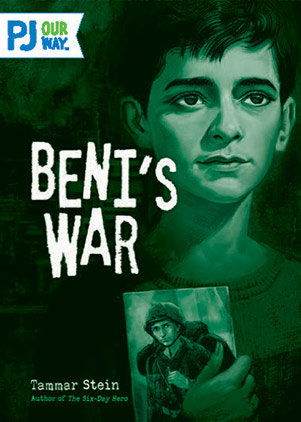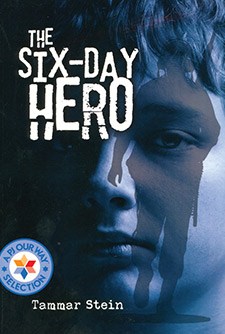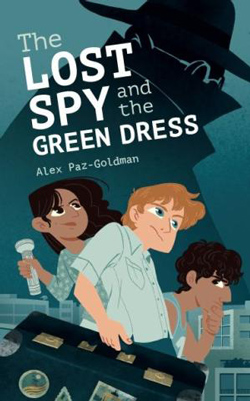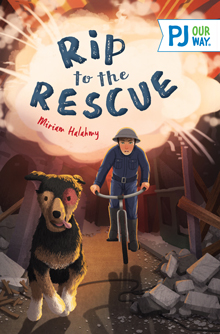Beni's War
Beni’s brother Motti is in the army when the Syrians attack Israel on Yom Kippur. Their other brother was a hero in the Six-Day War, but Beni can’t even stand up to the bullies at school. Can he find a way to be a different kind of hero?
Average Rating
( hint: Login to leave a review! )
118 Reviews
Leave Review
What the Book is About
Jewish Content & Values
Positive Role Models
Content Advisory
Talk it Over!
More for You
Twelve-year-old Beni’s family has moved from Jerusalem to a moshav in the north of Israel to make a fresh start after the death of Beni’s soldier brother, Gideon. Sensitive Beni finds it hard to stand up to the bullies at his new school, and his brother, Motti, is now a soldier, so he isn’t there to help. Then the Syrians attack, and the moshav is evacuated as war breaks out. Beni must find a way to forge new relationships with his classmates while he tries to make his own contribution to the war effort. Alongside Beni’s moving coming-of-age story, this gripping novel gives an insight into life in Israel during the Yom Kippur War. It is the sequel to the Sydney Taylor Honor Book The Six-Day Hero but can be read as a standalone novel.
- The book takes place in 1973 during the Yom Kippur War, and the descriptions of geographical settings, along with the effect of the war on everyone’s lives, give a vivid flavor of what life was like in Israel at the time.
- Families are in synagogue during Yom Kippur (the Day of Atonement) when the announcement comes that the country has been attacked.
- The family has a Shabbat (Sabbath) dinner.
- Motti is a supportive and loving older brother to Beni. He tries to keep the family’s spirits up when they worry about him going to fight. He is a brave and level-headed soldier.
- Beni is sweet, sensitive, and kind to younger children and outsiders. When the family loses contact with Motti, Beni hatches a courageous plan to find his brother. Eventually, Beni comes to see the Egyptian soldiers as people and not just the enemy.
Set during the Yom Kippur War, this book depicts some of the realities of war in Israel. While running away from the shelling, Beni trips and falls on top of Dor, the little boy he is carrying. Dor goes to the hospital, and Beni worries that he will never recover and blames himself. Motti, the protagonist of The Six-Day Hero, is now a soldier himself, and he is captured by the Egyptians. Distraught relatives seeking proof that their loved ones are still alive go to Haifa, where there are rooms of prisoner of war photos from Arab newspapers. This book is age appropriate, but because its focus is war, we recommend it for children 11 and over.
Beni tells the native-French-speaking teacher that the class bully had said Beni was cool, when in fact he had called Beni a “donkey’s ass.” The teacher believes him and uses the expression around her colleagues, then is upset to discover what she has really been saying. Why do you think Beni chose to keep Yoni out of trouble? What would you have done in his position?
Beni’s family home is on a moshav. A moshav is like a kibbutz in that both emphasize communal labor. However, the land on a moshav is divided into equal plots for farming, and the plots are individually owned rather than collectively (as on a kibbutz). There are several types of moshav, but the most common are the workers’ moshav, in which each family works its own land and keeps its own profit, but the marketing and purchasing of supplies are done communally; and the collective moshav, in which farming is done collectively, and profits are shared equally.
What the Book is About
Twelve-year-old Beni’s family has moved from Jerusalem to a moshav in the north of Israel to make a fresh start after the death of Beni’s soldier brother, Gideon. Sensitive Beni finds it hard to stand up to the bullies at his new school, and his brother, Motti, is now a soldier, so he isn’t there to help. Then the Syrians attack, and the moshav is evacuated as war breaks out. Beni must find a way to forge new relationships with his classmates while he tries to make his own contribution to the war effort. Alongside Beni’s moving coming-of-age story, this gripping novel gives an insight into life in Israel during the Yom Kippur War. It is the sequel to the Sydney Taylor Honor Book The Six-Day Hero but can be read as a standalone novel.
Jewish Content & Values
- The book takes place in 1973 during the Yom Kippur War, and the descriptions of geographical settings, along with the effect of the war on everyone’s lives, give a vivid flavor of what life was like in Israel at the time.
- Families are in synagogue during Yom Kippur (the Day of Atonement) when the announcement comes that the country has been attacked.
- The family has a Shabbat (Sabbath) dinner.
Positive Role Models
- Motti is a supportive and loving older brother to Beni. He tries to keep the family’s spirits up when they worry about him going to fight. He is a brave and level-headed soldier.
- Beni is sweet, sensitive, and kind to younger children and outsiders. When the family loses contact with Motti, Beni hatches a courageous plan to find his brother. Eventually, Beni comes to see the Egyptian soldiers as people and not just the enemy.
Content Advisory
Set during the Yom Kippur War, this book depicts some of the realities of war in Israel. While running away from the shelling, Beni trips and falls on top of Dor, the little boy he is carrying. Dor goes to the hospital, and Beni worries that he will never recover and blames himself. Motti, the protagonist of The Six-Day Hero, is now a soldier himself, and he is captured by the Egyptians. Distraught relatives seeking proof that their loved ones are still alive go to Haifa, where there are rooms of prisoner of war photos from Arab newspapers. This book is age appropriate, but because its focus is war, we recommend it for children 11 and over.
Talk it Over!
Beni tells the native-French-speaking teacher that the class bully had said Beni was cool, when in fact he had called Beni a “donkey’s ass.” The teacher believes him and uses the expression around her colleagues, then is upset to discover what she has really been saying. Why do you think Beni chose to keep Yoni out of trouble? What would you have done in his position?
More for You
Beni’s family home is on a moshav. A moshav is like a kibbutz in that both emphasize communal labor. However, the land on a moshav is divided into equal plots for farming, and the plots are individually owned rather than collectively (as on a kibbutz). There are several types of moshav, but the most common are the workers’ moshav, in which each family works its own land and keeps its own profit, but the marketing and purchasing of supplies are done communally; and the collective moshav, in which farming is done collectively, and profits are shared equally.




